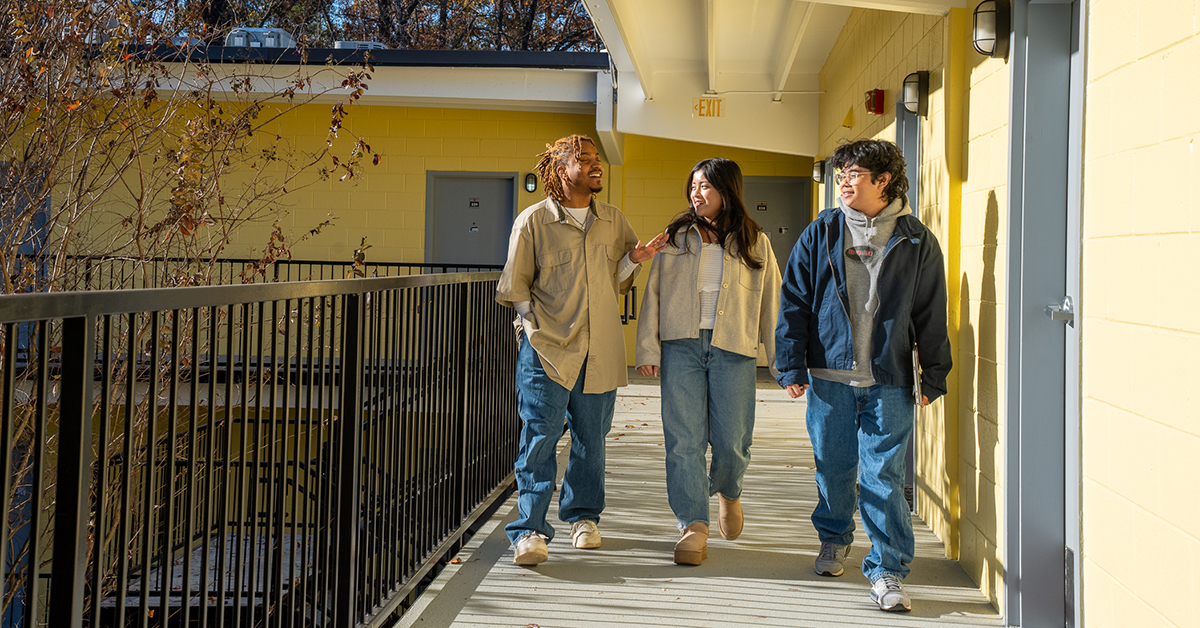Reporting Concerns
How to Report a Concern
Remember that as a member of the Oglethorpe University community you have a responsibility to uphold the code of conduct and to assist the university in promoting our values of Integrity, Respect, and Intellectual and Personal Development.
If you need immediate help
At Oglethorpe, we never want an act of power-based violence to happen, but if it does, call 911 for immediate help.
Call Us: To report student conduct incidents or complaints, please contact Campus Safety at 404-504-1998 or Residence Life at 404-364-8520.
Submit to the Campus Incident Reporting Form: This form is an opportunity for you to provide information concerning alleged policy infractions, common area damages, problems, or concerns. This information will only be used to initiate an investigation or as supporting evidence in a current investigation.
Student Conduct FAQs
The Student Code of Conduct addresses behavioral expectations relating to non-academic conduct. This includes behavior such as consumption or possession of alcohol, drugs, or other substances. It also can include harassment, intimidation and physical harm (for a full list of prohibited conduct, please review the Student Code of Conduct). Academic misconduct, such as plagiarism, or cheating on a test or exam, are handled and covered under the Honor Code.
Incidents of alleged violations of the Honor Code are reported in writing to the Advisor of the Honor Council or designee, whereas violations of the Code of Student Conduct and/or Residential Policies are reported in writing to the Assistant Dean of Students or designee. In your report, there is no need to include the regulation you think a student or student organization has violated. The appropriate Honor Code, Code of Student Conduct, and/or Residential Policies regulation will be assigned by the conduct officer. For individuals filing a report, a meeting can be arranged with the Assistant Dean of Students or Residence Life staff member to discuss the conduct process.
To report Student Conduct incidents or complaints, please contact Campus Safety at 404-504-1998 or Residence Life at 404-364-8520. You can also complete and submit an incident report using the online Campus Incident Reporting Form.
All conduct regulations are provided in the Honor Code, Code of Student Conduct, and/or Residential Policies. Examples of behaviors that could violate the Honor Code include cheating, plagiarism, and other acting academically dishonorable, whereas examples of behaviors that could violate the Code of Student Conduct and/or Residential Policies include underage possession of alcohol, driving under the influence, disruptive conduct, distribution of copyrighted material, sexual assault, theft, and others. You are strongly encouraged to read all conduct and residential policies.
Incident reports are reviewed by the Assistant Dean of Students. If the dean feels the report alleges misconduct then the case will be assigned to a conduct officer or other hearing body for review. If this happens, you will receive an e-mail from the conduct officer or hearing body notifying you of the alleged violation and to whom your case has been assigned. The process typically takes 1-2 business days. If it has been longer than that you can contact the Residence Life Office to inquire on the status.
The medical amnesty or Good Samaritan policy is meant to encourage students to seek help in the event of an alcohol or drug-related emergency. If you are worried about the health of yourself or a friend, your first priority should be to get help. By doing so, you may be eligible for medical amnesty, which is a process that is separate from the Student Conduct process. To learn more about the medical amnesty or Good Samaritan policy, please review the full policy here.
An informal resolution occurs when the student or student organization takes responsibility for the alleged violations and agrees to the sanctions proposed by the conduct officer. A formal hearing resolution occurs when the student or student organization disputes the alleged charges and/or proposed sanctions and wants to have the alleged violations decided by one of the hearing bodies.
Your conduct officer will explain the Student Conduct process to you. He or she will want to understand your perspective on what happened. Your officer will ask you questions and try to understand the incident based both on the written report and your perspective. If the officer believes you may have violated the Student Code of Conduct or Residential Policies, you will be asked to decide to accept responsibility or proceed to a formal hearing.
The Student Conduct Board (SCB) is the peer judicial review board for the campus community at Oglethorpe University. The SCB is comprised of a group of all students with a staff adviser. The Faculty-Staff Conduct board (FSCB) is a body of 3-5 faculty and staff members who meet with students and witnesses in usually serious conduct cases, especially complex cases and those involving sexual misconduct. You will be asked to give your perspective on the incident, and then the board members will ask you questions. The board then determines if you are responsible for violating the Student Code of Conduct or Residential Policies and if so, what sanctions to recommend.
The Assistant Dean of Students determines whether a report is reviewed by a conduct officer or a hearing board based on several factors, including the nature of the violation and conduct history of the student.[/collapse]
Believe their story. Survivors of violence need the support of their community. Validate their experience by saying things like “I believe you” and “Thank you for sharing your story.” It is important to allow them to finish sharing before interrupting or giving unsolicited advice. Sharing the experience of violence is difficult and they need a caring ear.
Respect privacy. An experience of violence is an incredibly personal experience. Someone sharing it with you does not mean that person wants you to share with everyone you know. Allow the reporting person to control her or his own story. If you need to talk to someone, reach out to confidential resources.
Ask what you can do. It is important for the reporting person to regain control of her or his life after an incident of violence. Ask first what the reporting person would like from you, before telling or instructing the survivor on what next steps to take.
Offer support resources. Get support yourself. As a secondary person experiencing the effects of violence, you may need support. Please reach out to the Oglethorpe Counseling Center or other resources to take care of yourself as you support your friend.
Do not retaliate against the person accused or the person reporting. It is important after incidents of violence to empower the reporting person to decide whether to engage the student conduct process or the criminal justice process. The University does not tolerate retaliation or discrimination against any person, and/or their family and friends, who brings forward a complaint, who cooperates in the investigation of a complaint, or who participates in the discipline process for an alleged violation of this policy. The University will not only take steps to prevent retaliation, it will also take strong responsive action if retaliation occurs. Anyone who believes they have been retaliated against as a result of their involvement with an investigation and/or discipline process for an alleged violation of the Policy on Sexual Misconduct should immediately report the alleged retaliation to the hearing coordinator or Title IX Coordinator.
You will be assigned sanctions. Sanctions are primarily educational in nature and may include activities like writing a reflection or research paper, attending a program or completing restitution hours on-campus. There are no mandatory or set sanctions, as each case is decided based on its own merit and the circumstances pertaining to the case. In some serious cases, sanctions may include probation or even suspension or expulsion from the university.
Either party may appeal the decision of the Conduct Board to the Dean of Students, in writing, within 24 hours of the decision. There are no appeals for informal resolutions.
The Student Judicial hold impacts registration, refunds, add/drops and transcripts. If you receive a student conduct letter and fail to make an appointment to meet with a Student Conduct Officer or Conduct Board, a hold will be placed on your account. Also, if you meet with a Student Conduct Officer or Conduct Board and are found responsible for a conduct code violation a hold is placed on your account until your sanctions are complete and documentation has been turned in to the Student Conduct Officer or Conduct Board Advisor. If your sanctions are not yet past their due date you can contact the Office of Residence Life Office at 404-364-8520 and request that your hold be removed for two days. If your sanctions are past their due date, your hold will not be removed until they are completed and documentation has been turned in to the Student Conduct Officer or Conduct Board Advisor.
The federal Family Educational Rights and Privacy Act of 1974 (FERPA) prohibits educational institutions from disclosing information from a student’s educational record (which would include disciplinary files) to any third party, including parents, without the student’s consent. The exception to this rule would be Parental Notification.
Students who are under the age of 21, unmarried, and financially dependent on their parent(s) may be subject to the Parental Notification exception to FERPA if they are found in violation of the Student Code of Conduct as it relates to alcohol and drugs. This exception permits the University to notify parents of a student found to be in violation of University policies involving the use of alcohol or controlled substances. The notification will include a statement indicating that the violation has occurred and that unless the student signs a release, any further information must be disclosed by the student.
It is the belief of the University that students benefit from discussions with their parent(s) or legal guardian(s) about the effects of alcohol or use of controlled substances including the effect of the use of alcohol or controlled substances on their educational experience.
The Office of Student Conduct maintains records from conduct violations for 7 years from the date of last University action unless the student is expelled, suspended or dismissed, in those cases the records are held permanently.
What if my file was expunged or I was found not responsible? What should I say then?
The best policy is to be honest on any application. Most applications will specify that they want to know about any disciplinary actions, even those where your file has been expunged or you have been found not responsible. Failure to disclose this information is often viewed as much worse than having been found responsible for a code of conduct violation.





